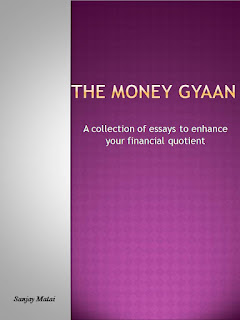Fixed Deposits and Non-ULIP Insurance Policies are considered to be the safest products, because you (normally) don't lose money by investing in these schemes.
Yet, they are the most risky investment you will ever make.
Oops, that sounds contradictory...
Here's the explanation:
Since you will get back your principal amount plus the interest, they are surely SAFE.
Since they will NOT be sufficient to meet your critical needs, they are surely RISKY.
Your child's education is a critical need. Education, especially higher education, is becoming expensive at around 10% year on year. Whereas, your Fixed Deposits will earn only around 7-8% p.a. and Non-ULIP Insurance Policies barely around 5-7% p.a.
Clearly, you will most probably end up with a shortfall, vis-a-vis the amount required for your child's higher education.
Let's put some numbers to this, to get a better perspective.
Your child is eight years of age. Ten years later, s/he will be competing to get into an IIT. The annual fees at IITs is presently around Rs.2 lakhs. So, the total cost for the 4 years works out to around Rs.10 lakhs (including sundry expenses) at the current prices.
At say around 10% inflation, in 2026 you will have to arrange almost Rs.26 lakhs for the 4-year engineering course at an IIT.
Option 1: Assume, that you have Rs.10 lakhs today to invest for the same.
Considering the importance of child's education, you take a firm stand to play absolutely safe. You prefer not to take any risk of losing any money. So, you invest this money in the so-called "safest" investments.
If your FD gives you 8% p.a. interest (and your tax liability is zero), after 10 years your investment would amount to about Rs.21.60 lakhs. Thus, as compared to your requirement, there is a shortfall of Rs.4.40 lakhs.
At 10% income tax liability, the corpus would be Rs.20 lakhs and shortfall Rs.6 lakhs.
At 20% income tax liability, the corpus would be Rs.18.60 lakhs and shortfall Rs.7.40 lakhs.
At 30% income tax liability, the corpus would be Rs.17.24 lakhs and shortfall Rs.8.76 lakhs.
If your insurance policy gives you 6% returns (which is tax-free), your total corpus would be around Rs.18 lakhs and shortfall Rs.8 lakhs.
Thus, the returns from your safest investments are not able to finance your child's education.
Doesn't this, therefore, mean that you are "risking" your child's education i.e. your safe investment is actually risky?
Option 2: You will save regularly for the next 10 years
Suppose, you don't have the lump sum amount available today (as in Option 1) and hence would like to save every year for your child's education.
Then, you would have to save the following amounts every month (under different scenarios):
- FD 8%. Zero Tax: Rs.13,800
- FD 8%. 10% Tax: Rs.14,500
- FD 8%. 20% Tax: Rs.15,100
- FD 8%. 30% Tax: Rs.15,800
- Insurance 6%: Rs.15,500.
However, if you were able to improve your returns to say 10% p.a. with zero tax (which is a very feasible expectation with Balanced Mutual Funds), you will have to do an SIP of only Rs.12,300 per month. This gives you a clear advantage of Rs.1500 to Rs.3500 per month.
In short, if your investment is lagging behind your objective, you are running a "risk" of not meeting the same, unless and until you invest more money.
In other words, it's a "risk" if your investments are not beating the inflation.
Concluding: If you are investing your money, such that you don't lose any money, you are looking at only half the picture.
You are ignoring the other (more important) half i.e. whether the corpus so created, would enable you to comfortably meet your requirements or not.
Most people don't look at the full picture, to get the right perspective. I am sure you don't want to end up in the same (leaky) boat.
Of course, the logical question would be...
... what if I cannot earn the projected 10% p.a. returns? After all, it is not a guaranteed return scheme.
Point noted:
But let us look at it this way.
With Fixed Deposits and Insurance, you will DEFINITELY be short of money.
With Balanced Mutual Funds, you MAY be short of money.
So, aren't Fixed Deposits and Insurance more "risky" than the Balanced Mutual Funds?
This is how you have to change the way you look at risk and safety. If not, you are only fooling yourself. You are blindly believing in the (non-existent) safety of some investments.
Investors become intelligent when they can correctly perceive what is safe and what is risky. Are you ready to become one; or remain the same old ignorant investor?
Don't Miss Reading this Important EndNote
Remember, there are options available to bridge the shortfall in your child's education (such as scholarships or education loan). However, there is NO ONE IN THE WORLD, who will finance the shortfall in your retirement corpus. Plus, your child's education is a matter of few years. Whereas, your retirement will easily run into a few decades. Thus, never compromise with your retirement planning. It could prove to be unimaginably disastrous.
Yet, they are the most risky investment you will ever make.
Oops, that sounds contradictory...
Here's the explanation:
Since you will get back your principal amount plus the interest, they are surely SAFE.
Since they will NOT be sufficient to meet your critical needs, they are surely RISKY.
Your child's education is a critical need. Education, especially higher education, is becoming expensive at around 10% year on year. Whereas, your Fixed Deposits will earn only around 7-8% p.a. and Non-ULIP Insurance Policies barely around 5-7% p.a.
Clearly, you will most probably end up with a shortfall, vis-a-vis the amount required for your child's higher education.
Let's put some numbers to this, to get a better perspective.
Your child is eight years of age. Ten years later, s/he will be competing to get into an IIT. The annual fees at IITs is presently around Rs.2 lakhs. So, the total cost for the 4 years works out to around Rs.10 lakhs (including sundry expenses) at the current prices.
At say around 10% inflation, in 2026 you will have to arrange almost Rs.26 lakhs for the 4-year engineering course at an IIT.
Option 1: Assume, that you have Rs.10 lakhs today to invest for the same.
Considering the importance of child's education, you take a firm stand to play absolutely safe. You prefer not to take any risk of losing any money. So, you invest this money in the so-called "safest" investments.
If your FD gives you 8% p.a. interest (and your tax liability is zero), after 10 years your investment would amount to about Rs.21.60 lakhs. Thus, as compared to your requirement, there is a shortfall of Rs.4.40 lakhs.
At 10% income tax liability, the corpus would be Rs.20 lakhs and shortfall Rs.6 lakhs.
At 20% income tax liability, the corpus would be Rs.18.60 lakhs and shortfall Rs.7.40 lakhs.
At 30% income tax liability, the corpus would be Rs.17.24 lakhs and shortfall Rs.8.76 lakhs.
If your insurance policy gives you 6% returns (which is tax-free), your total corpus would be around Rs.18 lakhs and shortfall Rs.8 lakhs.
Thus, the returns from your safest investments are not able to finance your child's education.
Doesn't this, therefore, mean that you are "risking" your child's education i.e. your safe investment is actually risky?
Option 2: You will save regularly for the next 10 years
Suppose, you don't have the lump sum amount available today (as in Option 1) and hence would like to save every year for your child's education.
Then, you would have to save the following amounts every month (under different scenarios):
- FD 8%. Zero Tax: Rs.13,800
- FD 8%. 10% Tax: Rs.14,500
- FD 8%. 20% Tax: Rs.15,100
- FD 8%. 30% Tax: Rs.15,800
- Insurance 6%: Rs.15,500.
However, if you were able to improve your returns to say 10% p.a. with zero tax (which is a very feasible expectation with Balanced Mutual Funds), you will have to do an SIP of only Rs.12,300 per month. This gives you a clear advantage of Rs.1500 to Rs.3500 per month.
In short, if your investment is lagging behind your objective, you are running a "risk" of not meeting the same, unless and until you invest more money.
In other words, it's a "risk" if your investments are not beating the inflation.
 |
| Are you looking at only HALF the picture when investing your money? |
Concluding: If you are investing your money, such that you don't lose any money, you are looking at only half the picture.
You are ignoring the other (more important) half i.e. whether the corpus so created, would enable you to comfortably meet your requirements or not.
Most people don't look at the full picture, to get the right perspective. I am sure you don't want to end up in the same (leaky) boat.
Of course, the logical question would be...
... what if I cannot earn the projected 10% p.a. returns? After all, it is not a guaranteed return scheme.
Point noted:
But let us look at it this way.
With Fixed Deposits and Insurance, you will DEFINITELY be short of money.
With Balanced Mutual Funds, you MAY be short of money.
So, aren't Fixed Deposits and Insurance more "risky" than the Balanced Mutual Funds?
This is how you have to change the way you look at risk and safety. If not, you are only fooling yourself. You are blindly believing in the (non-existent) safety of some investments.
Investors become intelligent when they can correctly perceive what is safe and what is risky. Are you ready to become one; or remain the same old ignorant investor?
Don't Miss Reading this Important EndNote
Remember, there are options available to bridge the shortfall in your child's education (such as scholarships or education loan). However, there is NO ONE IN THE WORLD, who will finance the shortfall in your retirement corpus. Plus, your child's education is a matter of few years. Whereas, your retirement will easily run into a few decades. Thus, never compromise with your retirement planning. It could prove to be unimaginably disastrous.








